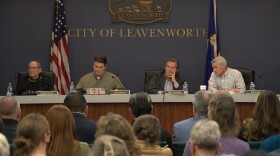A census question on citizenship could undercount populations in states with large numbers of poor and/or Hispanic residents — states like Texas. And an undercount would cut into the state's representation, and its federal services.
Counting is one thing. Culling is something else entirely.
As the federal government prepares for its once-every-decade count of the U.S. population, it has decided to ask residents whether they are U.S. citizens or not. At a time when immigration and sanctuary cities top Republican lists of political concerns, that question has less to do with counting and more to do with culling.
Including that question could be a strong disincentive for some respondents to even talk to a census worker, if they feel that answering in the negative — “Not a U.S. citizen” — might expose them to legal consequences. Being counted is one thing. Volunteering for immigration scrutiny is another.
It’s not an academic exercise, either — or someone else’s problem.
In a terrific preview of the 2020 census by the Tribune’s Alexa Ura and Chris Essig, the ties between the citizenship question and the Texas count were made explicit: “Almost 5 million immigrants live in the state, and it’s estimated that about two-thirds are noncitizens — legal permanent residents, immigrants with another form of legal status or undocumented immigrants. Additionally, more than 1 million Texans who are U.S. citizens live with at least one family member who is undocumented.”
Hispanics and poor people are already harder to count — whether there’s a citizenship question in place or not. Census tracts with lower-than-average response rates tend to have higher Hispanic and/or poor populations. Opponents to including a question on citizenship contend it will further increase chances of an undercount — particularly in areas with higher numbers of poor and Hispanic Texas residents.
The federal government could save itself billions of dollars in population-related programs and services by undercounting the state’s population, and critics of the decision to include a citizenship question in the 2020 census say a Texas undercount will be one of the results. Whether that’s a conflict of interest or a clever economic strategy is up to each voter.
An undercount could cost the fast-growing state some representation in Congress. It would also short-sheet Texas in funding for various federal programs, from transportation to health care, that are ladled out according to population.
Within the state, the effects could be even more pronounced.
When a state prepares for political redistricting following a census, the first thing that happens is called reapportionment, which is when the feds decide how many congressional seats each state should have. Texas now has 36; early estimates are that 39 might be in order after the next census.
The second piece is the redistricting itself, which is when state lawmakers carve Texas into congressional, legislative and State Board of Education districts. Counties do it with their commissioner seats, and so on.
If the 2020 census were to undercount Texas, and if the undercounted populations were evenly distributed across the state, the internal effects of an undercount would be relatively minor. But that’s not how the population is distributed. Remember: The census tracts with the lowest response rates tend to be more Hispanic and more impoverished than average. Take a look at the distributions of those tracts in Texas; more of them are in places like El Paso and Laredo than in Texarkana or Midland. That means, in turn, that certain parts of the state are more likely to be undercounted than others, and that the same kinds of inequities that start at the federal level will ripple through state programs and services.
It could have the effect of keeping people down. And if while you’re designing a program like the 2020 census you find that something you’re doing has a pretty good chance of keeping people down, you’re on the hook for what you ultimately decide to do.
In this case, that’s a choice between asking people to say whether they’re U.S. citizens or not, and — according to some demographers — dropping that question in the interest of getting a more accurate count of the number of people living in the U.S. and in each of its more than 73,000 census tracts.
It’s not like the people who aren’t counted will get out of the lines for state benefits, from education to roads to health and human services to prisons. They’ll still be in those head counts. It’s just that the feds won’t have to help pay for the services those uncounted Texans will receive.
Other places less affected by the counting rules will win out when it comes to politics, too. Seats in Congress are doled out — apportioned — according to population. An undercounted state will get fewer seats in Congress — less representation — than a properly counted one.
And Texas, with its large Hispanic and poor populations, could be one of the big losers if the census counts are incorrect.







